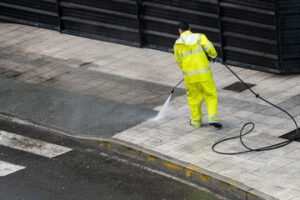Pressure Washing is a cleaning technique that uses an intense water stream to remove dirt, mildew, mold and other debris from outdoor surfaces. It is a great way to preserve surfaces and increase the curb appeal of your home.

Most pressure washers come with a variety of nozzles in different colors, each one with a different level of force. The most powerful nozzle is red, followed by yellow, then white. Contact Pressure Washing Austin Texas for professional help.
Pressure washing is a safe and effective way to remove dirt, mildew, mold, and other debris from surfaces. It uses a high-powered water stream that is typically pressurized to 1,500 or 3,500 pounds per square inch (PSI). This amount of pressure is enough to effectively clean many different types of surfaces, including asphalt shingles, brick, stucco, wood, vinyl siding, and concrete.
To ensure the safety of surfaces being cleaned, proper washing techniques must be followed and proper post-wash maintenance is required. Using eco friendly cleaning chemicals is also recommended as these products are safer for the environment and for people. These formulas are non-toxic, biodegradable, and often require less water to deliver the same level of cleaning power as traditional solvents.
It is important to choose the right pressure and nozzle for each surface being cleaned. Using too much pressure can cause damage to delicate surfaces, such as etching and cracking of painted surfaces or stripping and deterioration of wood. The distance of the nozzle from the surface being cleaned is also critical. Keeping the nozzle at least 6 to 12 inches away prevents damage and allows for sufficient pressure to effectively loosen dirt and grime.
Depending on the condition of your home’s exterior, you may need to use different settings for each area. For example, a wood deck may need more pressure than the exterior of a brick or stucco house. It is also important to identify and avoid sensitive surfaces, like windows, electrical outlets, and air conditioners.
Before the professionals arrive, it is a good idea to clear the workspace of obstacles and cover any items that could be damaged by the powerful spray. It is also helpful to communicate any specific cleaning needs or areas of concern to the professionals so that they can tailor their approach accordingly.
Lastly, it is wise to select a day with mild weather so that the soap and detergents don’t dry before being rinsed off. This helps to minimize the environmental impact of this type of cleaning and ensures that the surface is completely clean and free from any residue.
It’s Effective
Pressure Washing is a cleaning method that is incredibly effective at removing stubborn dirt, mold, mildew, and grime from surfaces like patios, walkways, sidewalks, driveways, and roofs. It can effectively dislodge even the most stubborn stains, such as those from oil or grease, that regular hoses and cleaning products struggle to remove. The power of pressure washing combines the principles of physics and chemistry to produce high-velocity water streams that penetrate and loosen dirt build-ups from surfaces, without damaging the surface or structure underneath.
To create this force, a small engine or motor converts mechanical energy into high-pressure water that is directed through a nozzle at high speeds. Unlike normal household faucets, which operate at a relatively low gallons per minute (GPM), professional-grade pressure washers can deliver up to 3,500 PSI of water flow, more than enough to damage most exterior surfaces. Using a specialized nozzle, the water is directed at problem areas in order to target them specifically and remove them efficiently.
When used correctly, the power of pressure washing is also environmentally friendly. Using biodegradable detergents, efficient machines that utilize less GPM, and capturing runoff water are key factors in reducing environmental impact. However, it is important to be aware that using too much pressure or harsh cleaners can harm various types of surfaces. Therefore, it is always recommended to hire a professional who can properly evaluate the appropriate psi and water rotation for each type of surface.
It’s also important to note that the spray from a pressure washer can be quite dangerous when pointed directly at someone or something, as it can cause serious injuries. To prevent this, it is essential to always wear proper protective clothing, including gloves, goggles, and long pants and sleeves, when operating a pressure washer. It is also a good idea to start with the lowest pressure setting and work your way up, testing out different settings as needed.
It’s Fast
Pressure Washing is a convenient and affordable way to refresh surfaces around the home, such as siding, decks, patio furniture, driveways and vehicles. It uses powerful pumps to boost water pressure and force it through a nozzle at high velocity, which eliminates dirt, grime, mold, mud, dust and other debris quickly and easily. A gas or electric powered pressure washer can quickly strip layers of dirt, rust, and paint from a variety of exterior surfaces and objects, and is an essential tool for anyone who wants to improve the look of their property.
It’s important to remember that pressure washing involves high-velocity sprays of water, and can cause damage if not used properly. It’s best to hire a professional who understands the nuances of the equipment, and how to use it correctly to achieve optimal cleaning results. Professionals will also have the proper tools and supplies to safely and effectively clean a variety of different surfaces, from wood to concrete.
Regularly pressure washing your property helps extend the life of your outdoor spaces, and prevents costly repairs down the road. Over time, mildew and mold can eat away at wooden surfaces, and crack concrete. Pressure washing removes these troublemakers, and makes for a healthier and more inviting space for your family, friends, pets and guests.
Whether you’re getting ready to sell your house, or just want to give it that “wow” factor, pressure washing is an effective and affordable solution for refreshing your exterior surfaces. If you’re planning to do it yourself, be sure to prepare the area by moving or covering any outdoor furniture, plants, and decorations that could be harmed by the water. Also, close all windows and doors, and cover outlets, doorbells, and light fixtures with tarps to prevent water penetration.
Hiring a professional to pressure wash your property will save you the hassle of purchasing or renting equipment, learning how to use it, and dedicating hours of your time to a large-scale cleaning project. They will take care of all the necessary preparations, and will complete the job efficiently and thoroughly. This provides you with a well-maintained and more attractive home, and frees up your time to enjoy it!
It’s Affordable
Pressure Washing is a great way to get your home or car looking like new again. It can remove grime, mud, mold and mildew that have built up on surfaces over time, making them look dull or even damaged.
It’s a relatively inexpensive and quick method of cleaning many surfaces, but you must be aware of the risks and follow proper safety measures. A professional can help you choose the right pressure washer for your needs and correctly use it to avoid damage or injuries.
Power washing uses hot water and high-pressure water to blast away dirt, grime, grease, oil buildup, and other contaminants from various surfaces. It is ideal for removing stubborn and deep-set stains and can be used on a variety of surfaces, including wood decks, concrete driveways, brick, siding, and more. Power washers can have nozzles with different spray settings, from a narrow stream to a fan tip, and the distance between the nozzle and the surface being cleaned affects the intensity of the pressure.
A professional will know the right nozzle to use for each surface and how much pressure to apply, as well as which cleaning products are best for which surfaces. They can also adjust the PSI (pounds per square inch) of the water coming out of the nozzle to suit your needs.
Using too much pressure can damage surfaces, strip paint, and harm surrounding vegetation. It is important to carefully plan and prepare each surface before starting to ensure a clean, safe, and effective job. Keeping a routine maintenance schedule with affordable pressure washing can make your house or car look brand new again!



